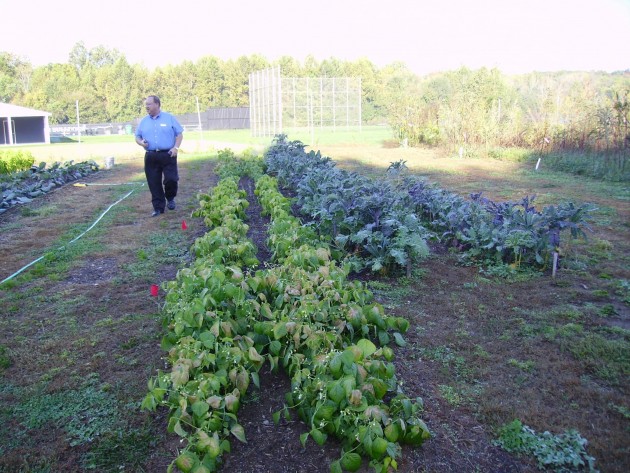
After many attempts and much discussion, plans to begin a community farm in Greencastle are underway.
The idea for a student-run farm at DePauw had been discussed for a while, but it was not until sophomore Ashley Conard and junior Stephen Hesterberg picked up the project this summer that the idea became action.
The two-acre produce farm will be for the use of students, the Greencastle community and Sodexo, DePauw's food provider. The mission for the campus farm is to enrich the education of students through experiential, hands-on learning and research, provide an example of sustainability for the campus and provide sustainably grown produce to the university and community. It will be located on Sunset Drive near the Prindle Institute for Ethics.
"There are so many possibilities for the farm," Conard said. "Students from all different majors can use this tool. We can eat the organic food produced at our university dining facilities. We can share the food with the Greencastle community."
Campus farms have recently gained popularity at universities around the country. Conard and Hesterberg, along with faculty and staff members, believe that DePauw would benefit from the creation of a student-organized farm on campus.
"I attended a seminar at Dickinson College on running campus farms recently," said Carol Steele, director of the Office for Sustainability and associate dean of Academic Affairs. "I was amazed by how much of an impact the farms had on the students. Universities' farms were all different sizes but they all had one thing in common — the farms were changing students lives and college experiences."
Not only will the farm be a valuable learning tool, it will also be a social experience. The farm provides people with a reason to get together, to discuss and to work. The project has already united many different people on its governing board. The board consists of students, professors, general manager of dining services and Sodexo employee Steve Santo, and representatives from the Office of Sustainability, the Center for Spiritual Life and Facilities Management.
"I think the farm is going to be a great way for students and the community to connect culturally," Conard said. "Everyone has food in common and food definitely isn't going out of style anytime soon."
Now that the ball is rolling on the planning and organization of the farm, the next step is to get the rest of the student body involved. Both Conard and Hesterberg will not be on campus next semester, so both emphasized the dire need for new student involvement.
"We have both worked so hard on this project and we hope that we can keep it going, but it's crucial that other students get involved. We need to find people who are interested in supporting the farm, but also are interested in being involved in the further development of this farm," Conard said.
The creation of the farm will require a significant amount of labor. Crops will need to be planted, cared for and harvested. The majority of the labor will take place in the summer, when the fewest number of students are on campus. The more students that get involved and know about the farm, the better the farm will be, said Conard.
"This is a great opportunity for everyone to get involved in," Steele said. "It's the type of experience that can provide growth for all — no pun intended."
Hesterberg complemented Steele's sentiments, stressing the importance of teaching sustainability.
"I fully believe a liberal arts university must prepare students to deal with the global problems that our nation faces today. One of those issues is the environment and our role in it," Hesterberg said. "During their time here, if students do not learn about the environmental issues we face, when will they?"


